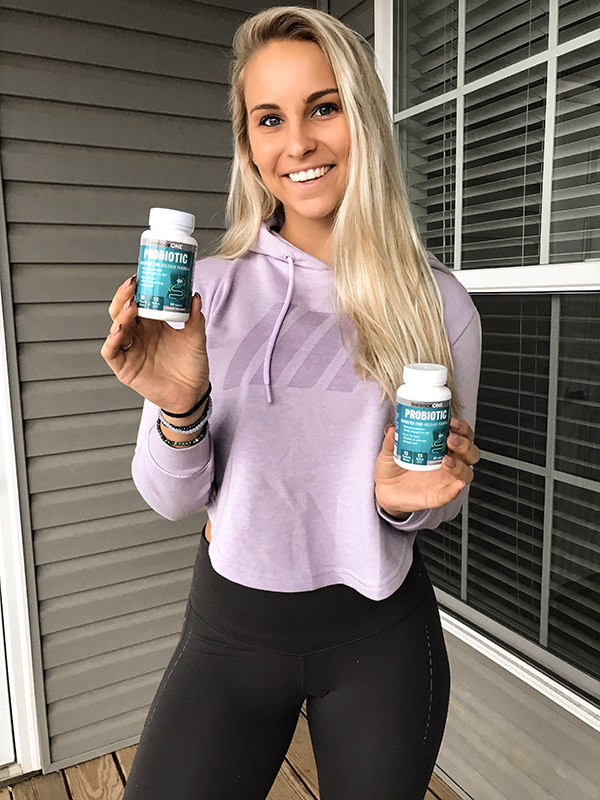5 Ways Probiotics Can Help with Acid Reflux
Discover how restoring your gut balance can ease reflux naturally—without relying on antacids.
Acid reflux can feel like a constant battle. Burning in your chest, discomfort after every meal, and the frustration of reaching for antacids that only offer temporary relief. But what if the root cause of reflux is not just excess acid—what if it’s an imbalance in your gut?
Probiotics, the beneficial bacteria that live in your digestive system, can play a powerful role in calming acid reflux. By supporting healthy digestion and restoring balance in your gut, they can help prevent those uncomfortable flare-ups. Here are 5 ways probiotics can help with acid reflux:

1. Rebalance Your Gut Bacteria
Your digestive system is home to trillions of bacteria, and maintaining the right balance between good and bad bacteria is key to healthy digestion.
When harmful bacteria take over—often due to antibiotics, stress, or diet—it can slow down digestion and trigger reflux.
Probiotics replenish your good bacteria, which improves digestive efficiency and reduces the likelihood of acid backing up into the esophagus. A balanced gut microbiome means your digestive system can handle meals with less strain.
2. Improve Digestion and Reduce Gas
Poor digestion often leads to bloating, excess gas, and abdominal pressure—factors that can push acid upward into the esophagus.
Probiotics aid in breaking down food more effectively, preventing fermentation and gas buildup in your stomach.
By reducing bloating and supporting the natural movement of food through the digestive tract, probiotics can help prevent that uncomfortable “fullness” that often precedes reflux.


3. Support Healthy Stomach Acid Levels
Reflux is not always caused by too much stomach acid—it can be the opposite. Low stomach acid levels make it harder to break down food, which leads to delayed emptying and reflux symptoms.
Probiotics help create an environment where stomach acid levels are balanced and food is digested more efficiently.
This prevents food from sitting too long in the stomach, one of the common triggers for acid reflux.
Tired of Treating the Symptoms Instead of the Cause?
Antacids and reflux meds only mask the problem. But if your reflux stems from gut imbalance, there’s a better way to fix it.
Our time-release probiotic helps restore healthy digestion, reduce acid buildup, and calm reflux—naturally and gently.
Used by over 100,000 customers to support their digestive health.
4. Strengthen and Protect the Gut Lining
The gut lining acts as a barrier that protects your digestive tract from irritation and inflammation. If this lining becomes compromised, it can cause increased sensitivity and make reflux symptoms worse.
Probiotics strengthen the gut barrier by encouraging the growth of beneficial bacteria that protect and repair this lining.
This added protection helps calm the digestive tract and reduces the irritation that can lead to burning and discomfort.


5. Reduce Inflammation in the Digestive Tract
Inflammation is at the root of many digestive issues, including acid reflux.
An imbalanced gut microbiome often triggers chronic low-level inflammation, which can irritate the esophagus and worsen reflux symptoms.
Probiotics naturally reduce inflammation by restoring balance to your gut bacteria, creating a calmer, healthier environment throughout your digestive system.
Now that you know how probiotics can help with reflux… here’s the easiest way to start.
"Love this probiotic! It truly has been a life saver for me... I no longer suffer from acid reflux or constant diarrhea or gas." — Jane J, verified customer

Support Your Gut. Stop the Reflux.
Our time-release probiotic targets the root cause of reflux—gut imbalance.
Just one tablet a day to feel lighter, calmer, and more in control.
This isn’t just another probiotic. It’s a time-release formula designed to help reduce acid buildup, calm reflux, and restore long-term gut balance—without the side effects of antacids or PPIs.
Daily Gut Support: Helps reduce bloating, ease reflux, and restore balance
Advanced Formula: 12 targeted strains, 15 billion CFUs, and time-release delivery for all-day effectiveness
Trusted Quality: Vegan, non-GMO, and third-party tested for purity and safety
What People Are Saying
Research
1. Zou, Y., Xue, W., Luo, G., Deng, Z., Qin, P., Guo, R., & Su, W. (2019). Effect of probiotics on gastrointestinal motility: A systematic review and meta-analysis. Journal of Neurogastroenterology and Motility, 25(4), 486–500. https://doi.org/10.5056/jnm19105
2. Pinzone, M. R., Celesia, B. M., Di Rosa, M., Caminiti, F., Coco, C., Nunnari, G., & Cacopardo, B. (2016). Effect of a probiotic supplement on symptoms in patients with gastroesophageal reflux disease: A randomized clinical trial. Clinical and Experimental Gastroenterology, 9, 151–157. https://doi.org/10.2147/CEG.S100769
3. Gibson, G. R., & Roberfroid, M. B. (1995). Dietary modulation of the human colonic microbiota: Introducing the concept of prebiotics. The Journal of Nutrition, 125(6), 1401–1412. https://doi.org/10.1093/jn/125.6.1401
4. Imhann, F., Vich Vila, A., Bonder, M. J., Fu, J., Gevers, D., Visschedijk, M. C., ... & Weersma, R. K. (2016). Proton pump inhibitors affect the gut microbiome. Gut, 65(5), 740–748. https://doi.org/10.1136/gutjnl-2015-310376
5. Freedberg, D. E., Toussaint, N. C., Chen, S. P., Ratner, A. J., Whittier, S., Wang, T. C., ... & Abrams, J. A. (2015). Proton pump inhibitors alter specific taxa in the human gastrointestinal microbiome: A crossover trial. Gastroenterology, 149(4), 883–885.e9. https://doi.org/10.1053/j.gastro.2015.06.043
6. Tursi, A., Brandimarte, G., Elisei, W., Giorgetti, G. M., Inchingolo, C. D., & Aiello, F. (2007). Effect of probiotic supplementation on the occurrence of small intestinal bacterial overgrowth in patients treated with omeprazole: A pilot study. European Review for Medical and Pharmacological Sciences, 11(1), 33–38.
7. Ringel, Y., Ringel-Kulka, T., Maier, D., Carroll, I., Galanko, J., & Leyer, G. (2015). Probiotic supplementation in patients with GERD: A randomized, double-blind, placebo-controlled pilot study. Neurogastroenterology and Motility, 27(12), 1792–1800. https://doi.org/10.1111/nmo.12697